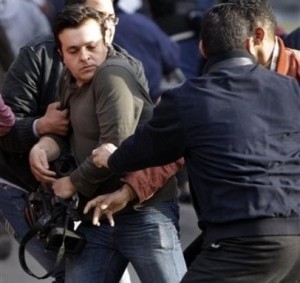The situation takes on a chaotic look in Egypt. Since the last speech of Hosni Mubarek pronounced on Wednesday February 2, the clashes between the pro and anti Mubarek are increasingly violent. The assessment increases from hour to hour. The figures reach ten deaths and more than 800 injured in the last two days.
The situation worsens all the more since international journalists are taken to task in these events. Egypt gradually rushes towards unprecedented media hermeticism. After having cut access to the Internet and the ban by Al Jazira de Satellite it is the journalists’ turn to be “driven from the playground”. A muscular and sometimes even violent hunt (threats, arrests, blows, destruction of the material) is launched towards journalists from Al Jazira, CNN, BBC, Figaro … from pro Mubarak.
Tension rises between power and journalists. Having become too bulky, the pro Mubarak try by all means to silence the voices of the truth and to prohibit journalists from bringing the reality of the violence of clashes to the rest of the world. A scandalous practice which becomes alarming not only for journalists but also for the nature of the acts that these people seek to hide in the eyes of the world.
Friday, February 4 was declared “Departure Day”. Calls for demonstrations for the total fall of the regime and the president’s departure resounded from everywhere. Hosni Mubarak expressed his desire to resign but fearing to see the country plunge into total chaos, has changed. He even declared in response to the calls of the President of the United States, Barack Obama that the latter “did not understand Egyptian culture and what would happen if he left power now”.
The world retains its breath, the Egyptian situation becomes more worrying than promising.








